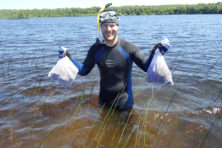Visiting Researcher Discusses Manure Digesters
- Share
- Tweet
- Pin
- Share
The recoil of Jacksonport’s manure spill scare in late 2014 has started to simmer down and the town is now thinking about how to prevent it in the future. Open discussion between environmentalists and farmers is still stagnant and so they turned to technology.
At the Ad Hoc Environmental Committee meeting on Sept. 14, Gregory Kleinheinz from the University of Wisconsin-Oshkosh (UWO) spoke on the use of manure digesters and how they might be applied in Door County. UWO has implemented digesters of different capacities on campus and in two satellite locations.
Digesters take in waste and put out biogas, which is used for electricity and heat, solid fibers used for animal bedding, and nutrients that can be applied to crop fields. The systems associated with UWO generate enough electricity to sell back to the grid and recoup some of the equipment cost. While this return on investment is attractive to farmers, Kleinheinz warned against the low financial return.
“If you think you’re going to make a lot of money selling back electricity, it’s not going to happen,” he said. “If you think you’re going to install this and then break even, that’s definitely possible.”
The financial benefit depends on the ability to put enough material into the digester, called feedstock, to create enough electricity to sell. UWO uses leftover food from grocery stores and manure deposited by a 9,000-cow farm. No single farm in Door County has enough feedstock to make the equipment worthwhile. Energy companies must also want to buy the electricity that you have to sell. These factors and a few others make the expensive equipment cost prohibitive to the Door County farmer, but Kleinheinz thinks technology will catch up and bring the cost down.
But those who got sick in Jacksonport last year don’t care if the farms can make money on manure. They want clean water and proper management.
“Some of the biggest potentials for [digesters] is managing nutrients and moving things from all your phosphorus and nitrogen being in one spot to moving it economically to other places and spread that to where it really needs to go,” said Kleinheinz. Reusing the water that is drawn from the manure is also a hot topic of research.
“One thing digesters are really good at is pathogen destruction,” said Kleinheinz. Digesters are proven to be successful in destroying harmful pathogens so that if manure does get into the groundwater, it is less likely that someone will get sick.
“Any manure in your groundwater is not good,” said Kleinheinz. “But you would have the nutrients in your groundwater and a lot less organisms that have the potential to cause human disease.”
John Lasee, Jacksonport farmer, stated that the best practice is simply to apply manure at the correct times, often allowing the UV light from a sunny day to break up the harmful materials in manure after it is laid in a field.
“Many years ago, many farms did this daily spreading before the whole process of storage and twice a year spreading and all these problems we now have,” said Lasee. “These projects are not going to eliminate the need for nutrient management. We’re over-applying at two points during the year. So there’s no easy solution that you can throw up a digester and all your problems are going to go away. You’ve got positives and negatives and society has to weigh the benefits.”
Kleinheinz does not think that digesters are practical for many farms at their current price level but is confident that improving technology and greater demand for environmental concern will bring the price down. When that happens, their applicability in places like Door County will be further explored.
Farmers, including Lasee and Haberli Farms, were not excited at the thought of an expensive new piece of equipment doing something that they feel can be accomplished with a little more consideration.
Dale Konkol of the Door County Soil and Water Conservation Department stated that although the practices outlined by Lasee, such as more frequent nutrient spreading, worked for the small farms in past decades, but the larger farming operations that have taken over are producing too much waste to be appropriately managed.
For now, new technology sits on the horizon while Jacksonport continues to dig for answers on how to protect their groundwater.



